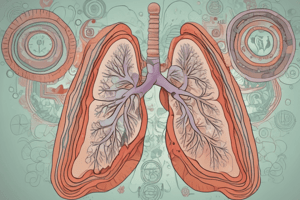Podcast
Questions and Answers
Which condition is characterized by a patient being short of breath at rest with an SpO2 of 50 and a pH less than 7.35?
Which condition is characterized by a patient being short of breath at rest with an SpO2 of 50 and a pH less than 7.35?
- Chronic Obstructive Pulmonary Disease (COPD)
- Healthy lung function
- Severe acute respiratory failure (correct)
- Mild asthma attack
What underlying condition could result in hypoxic respiratory failure due to decreased oxygen?
What underlying condition could result in hypoxic respiratory failure due to decreased oxygen?
- Obesity leading to hypoventilation (correct)
- Active smoking without respiratory symptoms
- Asthma with controlled medication
- Moderate exercise in healthy individuals
Which of the following conditions is least likely to be associated with respiratory failure symptoms?
Which of the following conditions is least likely to be associated with respiratory failure symptoms?
- Opioid overdose
- Properly managed COPD (correct)
- Brain injury
- Spinal injury
Which scenario would most likely lead to oxygenation failure?
Which scenario would most likely lead to oxygenation failure?
Which of the following indicates that a patient might be at risk for acute respiratory failure?
Which of the following indicates that a patient might be at risk for acute respiratory failure?
Flashcards are hidden until you start studying
Study Notes
Acute Respiratory Failure (ARF)
- Acute respiratory failure (ARF) is a critical condition characterized by the inability of the respiratory system to maintain adequate gas exchange.
- It is defined by a set of significant symptoms (SS) rather than a specific diagnosis.
Symptoms of Acute Respiratory Failure
- Shortness of breath (SOB) at rest indicates a severe level of respiratory distress.
- Oxygen saturation (SpO2) can drop to 50%, often accompanied by a pH level of less than 7.35, indicating acidosis.
Common Causes of ARF
- Chronic Obstructive Pulmonary Disease (COPD) can lead to exacerbations resulting in ARF.
- Brain injuries may impair the respiratory center in the brain, leading to inadequate breathing.
- Asthma attacks can significantly obstruct airflow, causing acute respiratory distress.
- Opioid overdose diminishes respiratory drive, contributing to hypoventilation and ARF.
- Spinal injuries can disrupt nerve signals that control diaphragm movement and breathing.
- Pain may lead to shallow breathing patterns, exacerbating respiratory failure.
- Head injuries can affect autonomic functions, including respiration.
- Obesity increases the risk of hypoventilation due to excess body weight.
Mechanisms of Oxygenation Failure
- Hypoxia caused by various factors can lead to decreased oxygen levels in the blood.
- Airway blockage, whether due to foreign bodies, inflammation, or secretions, significantly impairs airflow.
- Alveolar issues, such as fluid accumulation or collapse, can result in ineffective gas exchange.
- Oxygenation failure arises from an inability to maintain proper oxygen levels, necessitating urgent medical intervention.
Studying That Suits You
Use AI to generate personalized quizzes and flashcards to suit your learning preferences.





